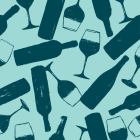Wine label translation app to launch in 2020
Australian tech startup Third Aurora has announced plans to launch an artificial intelligence application that can translate wine bottle labels into any language.
The app, which displays a translated augmented reality label via a smartphone screen, has already piqued the interest of wineries around the world, with 88 properties signing up to take part in field trials.
As well as wine bottle labels, the app will be able to translate tasting notes and videos, and display dynamic content, 3D objects and social media links directly onscreen.
According to Third Aurora director Dave Chaffey, the company hopes the app will eventually be able to function in more than 100 languages. “If you’re a wine lover it’s a handy addition to have in your front pocket,” he says, adding that he expects the app to launch towards the end of 2020.
France anticipates small harvest in 2019
France’s 2019 wine harvest is expected to drop by between 6-13% compared to last year’s, according to the agriculture ministry’s statistics department, Agreste.
Figures suggest France is on track to produce up to 46.4 million hectolitres – less than usual – due to tumultuous weather challenges. According to some winemakers in Languedoc-Roussillon, grapes looked like they had been ‘blowtorched’ by record heat levels, while Agreste predicts that production in Jura could shrink by as much as 40% due to damaging frost.
However, no assessment has yet been made on potential quality, and as Decanter reports, several winemakers have disagreed with the forecast, stating that there is “still much to play for” in the vineyards.
Rosé Prosecco category to launch in 2021
The Prosecco DOC Consortium has announced a new rosé category for Italy’s famed fizz.
Harpers reports that the idea has been in the pipeline for some time, but producers are eyeing January 2021 as a potential launch date for pink Prosecco.
The Consortium has given the go ahead for rosé to be made from Glera and Pinot Noir grapes, and may demand it be a ‘millesime’ category, meaning only vintage wines are permitted.
Sandra Janetzki, vice president of Henkell Freixenet, told Harpers that they are expecting to harvest the grapes for their first rosé Prosecco in 2020, with a potential market launch in 2021.
“In general, the Consortium has given its approval for a rosé Prosecco made from Glera and Pinot Noir grapes, but there are still some legal issues that need to be dealt with before the harvest and production of a rosé Prosecco can start,” she added.
Nanotechnology used to remove common wine faults
Nanotechnology could be the key to removing faults such as smoke and cork taint from wine, according to researchers in Australia.
Wine Australia says that the technology – which studies and manipulates atoms and molecules – could have a substantial impact on the wine sector and address a range of problems at a molecular level.
The announcement follows the successful use of the technology to develop a polymer that removes methoxypyrazine – the compound that creates the ‘green capsicum’ aroma – from Cabernet Sauvignon
Dr Agnieszka Mierczynska-Vasilev of the Australian Wine Research Institute (AWRI) said the benefits of the process was that it was fast, solvent free, could be applied at low temperature, and required no surface activation or pre-treatment.
“I am convinced that nanotechnology will have a substantial impact on the wine sector in the future in areas such as adjusting the sensory properties of wine to achieve better taste or texture or modifying nutritional value, potentially offering benefits for both the sector and the consumer,” she said.






